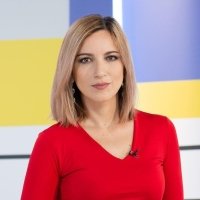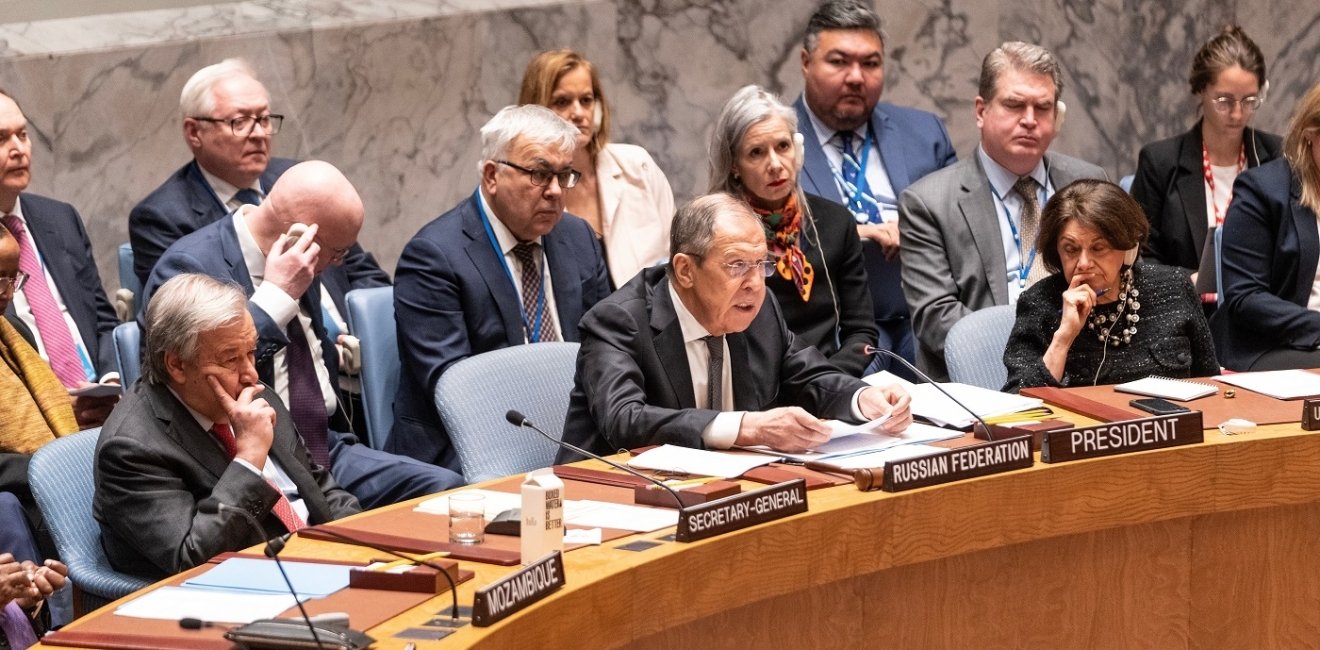
A blog of the Kennan Institute
Sergey Lavrov is one of the most visible faces of Russia’s war against Ukraine. Here he is sitting at the famous round table in the room where the UN Security Council meets. Next to him is UN Secretary-General António Guterres.
“The Kyiv regime implemented the theory and practice of Nazism legislatively and in everyday life. Without embarrassment, they organized pompous torchlight processions in the center of Kyiv and other cities under the banner of SS divisions.” Other members of the Security Council are watching Lavrov read from a piece of paper. “The West was silent and rubbed its hands.”
These words have nothing to do with reality. Ukraine’s ultra-right lost both the 2014 and the 2019 parliamentary elections. But the U.S. ambassador to the UN, Linda Thomas-Greenfield, listens. No one interrupts the speaker from Russia. He goes on, describing how vile Americans deliberately developed Nazism in Ukraine, how in 1999 Americans had bombed the Chinese embassy in Belgrade and in the closing days of World War II had attacked Hiroshima and Nagasaki.
It’s spring 2023 right now, and another Russian army strike targeting apartment blocks in the Ukrainian city of Uman takes the lives of at least thirteen people. A thirty-one-year-old woman and her two-year-old child die in strikes on the city of Dnipro. Sergey Lavrov has nothing to say about those incidents.
Lavrov’s Choice
Once upon a time, long before the full-scale Russian invasion of Ukraine, Lavrov was considered an ambiguous figure, a Moscow intellectual with a good, specialized education and a true understanding of the role of a diplomat. Even his opponents in Washington treated Lavrov with respect. “He would appear in the room, and it was immediately clear that a professional had entered”—this is what they said about the head of the Russian Foreign Ministry.
But Vladimir Putin does not need such a figure. It is difficult to say at what specific moment Sergey Lavrov was offered a choice. Or, quite possibly, this choice was made by default, without any discussion. Anyway, at some point—when it became an obvious crime to remain in power, when excuses of any kind stopped working—Lavrov remained in power. And he dived into a campaign of promoting the massacre of citizens of a neighboring state.
Unlike many, Sergey Lavrov should understand well what is happening. A professional with many years of experience, with connections, and in constant communication with people outside the Kremlin circle, he knows that NATO was not preparing an attack on Russia. He is aware there were no plans to accept Ukraine into NATO in the foreseeable future. Lavrov also knows there was no genocide in Donbas before the start of the full-scale war. Of course, he is aware that it was his boss who attacked a neighbor. The greater the responsibility of Sergey Lavrov, the more cynical his statements become. A variety of Western sanctions have been imposed on the Russian foreign minister.
Is Russia’s Position on the UN Security Council All That Permanent?
And now this same minister arrives in the United States of America, which induces a dizzying sense of madness. Sergey Lavrov chairs the UN Security Council. He has the right to. The Russian Federation is one of the five permanent members of the Security Council. It rose to the chairmanship simply because this is how the system works: the palm passes from one country to another in alphabetical order, and now it has come to Russia. Until the end of April, Moscow sets the agenda.
For Lavrov, preservation of this structure with all its 35,000 employees, its skyscraper on First Avenue, and the tedious flights across the Atlantic, is fundamental. The UN is one of the few international platforms where Russia is not denied access. Moreover, it is legally impossible to exclude Moscow from the Security Council; the very mechanisms of the UN give the leading role to the victors of World War II. Russia’s place as the recognized legal successor of the USSR is inviolable, experts say. After all, it is enshrined in the charter!
But there are other experts who wonder, what about the PRC’s case? The UN charter mentions the Republic of China—that is, Taiwan. In 1971, under pressure from Beijing and the countries of the socialist bloc, the seat on the Security Council (and more broadly at the UN) was transferred to the People’s Republic of China, and specifically to communists from the mainland. Isn’t this a precedent?
With the collapse of the Soviet Union, newly independent, internationally recognized states appeared, but it was Russia that took a seat on the Security Council. It was Russia, designated as among the “winners” of World War II. It may look as though the contributions of Ukraine, Georgia, Armenia, Belarus, and others to that victory are insignificant. But it was the sacrifice of all the Soviet socialist republics in the fight against fascism that helped end the war, so why are Moscow’s merits valued higher?
Yes, in 1991 a CIS declaration was signed recognizing Russia’s right to take the place of the Soviet Union, but now, according to a number of analysts and politicians, the time is ripe to review the status quo.
A Tethered Security Council
On the one-year anniversary of Russia’s invasion of Ukraine, Time magazine published an article under the authorship of three Ukrainian lawyers, members of the Ukrainian parliament.
“Russia must be brought to justice,” they wrote. “UN membership was meant to be restricted to ‘peace-loving states.’” If the country’s regime were to change, of course it should be possible for its membership to be restored by a vote of the General Assembly. But until then, the very viability of the UN as a peacekeeping organization suffers as long as its members are forced to negotiate with a political regime that has been deemed, by the European Parliament and others, a state sponsor of terrorism.
There are many questions about the UN and its effectiveness. The most obvious one is that the organization exists in order to ensure peace and security. But this role has not been fulfilled for a long time: the March–June 1999 NATO bombing of Yugoslavia, which the Russian Foreign Ministry so often refers to, was carried out without the approval of the Security Council. Another example is the United States’ and its allies’ invasion of Iraq, which proceeded without Security Council approval.
Moscow concluded that a giant rusty machine consisting of a revolving door of people, offices, schedules, meetings, negotiations, documents, statements, handshakes, publications, discussions, condemnations—and, most important, an impressive budget—would continue to roll on for some time and in some senseless direction by inertia alone. So what do we see? We see how one of the few members of this privileged club starts a war, and at the same time with its veto power blocks attempts to protect the victim.
What is the practical meaning of the UN Security Council? In October 2022 the UN adopted a resolution condemning the annexation of Ukrainian regions. In favor: 143 states. Against: 5, with 35 abstaining. This means that Russia is in an obvious, undeniable minority. Moreover, the International Criminal Court has issued a warrant for the arrest of the president of Russia, who is suspected of war crimes. If Russia had not blocked the resolutions of the Security Council, the UN would have been able to send a peacekeeping contingent to Ukraine. But there is no such possibility. Instead we are witnessing the absolute impotence of the only body in the world that should, in theory, protect civilians, wherever they are attacked.
“Where Is the Peace?”
“So where is the security that the Security Council needs to guarantee? It’s not there. Although there is a Security Council—so where is the peace?” Ukraine’s president Vladimir Zelensky uttered these words in his April 5, 2022, video address to the Security Council. He suggested that the UN either reform and throw the aggressor out of the Security Council or dissolve itself.
A year has passed, with no change. Before our very eyes, the pillars of the international peacekeeping order are shaking. Obviously, those who could now start the procedure for revising the UN rules are afraid of even sharper shocks and do not want to provoke, thus finally turning the world into one big powder keg.
There is some rituality in the appearance of Sergey Lavrov in New York. The speech at the UN is a vestige of Cold War performances, an echo of the conferences at Yalta and Potsdam in which the world was shared between the USSR and the United States. This image is important to Putin. It is how he would like to see the current crisis resolved, with a meeting of two adult guys (or more likely three, as such a meeting probably would not take place without Xi Jinping) somewhere in neutral Switzerland, a world map on the table in front of them, pencils in hands. Perhaps the president of Russia, who does not use the internet, simply did not notice that times have changed.
The opinions expressed in this article are those solely of the author and do not reflect the views of the Kennan Institute.
Author


Kennan Institute
After more than 50 years as a vital part of the Wilson Center legacy, the Kennan Institute has become an independent think tank. You can find the current website for the Kennan Institute at kennaninstitute.org. Please look for future announcements about partnership activities between the Wilson Center and the Kennan Institute at Wilson Center Press Room. The Kennan Institute is the premier US center for advanced research on Eurasia and the oldest and largest regional program at the Woodrow Wilson International Center for Scholars. The Kennan Institute is committed to improving American understanding of Russia, Ukraine, Central Asia, the South Caucasus, and the surrounding region through research and exchange. Read more

Explore More in The Russia File
Browse The Russia File
Chechnya as a Model of Modern Russia

Russia’s Indigenous Communities and the War in Ukraine

Gas and Power in a Changing US–Russia Relationship

